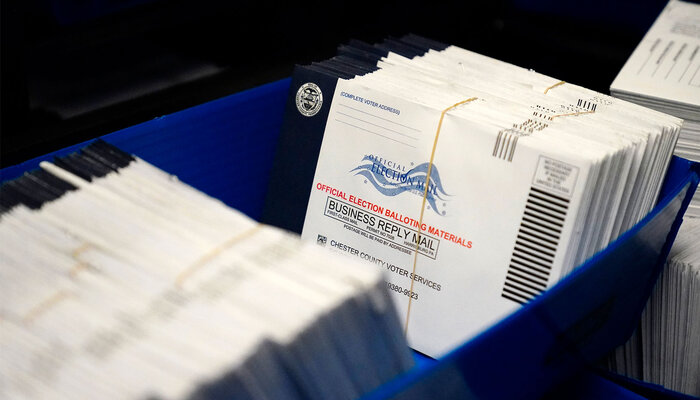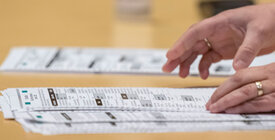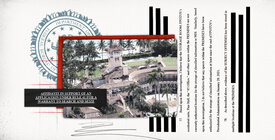Americans living abroad, including military members and their families, nonprofit workers, and other citizens, have the right to vote. This group of nearly 3 million people meet similar eligibility standards to what’s required of their fellow citizens at home. Every state has a system of checks in place to ensure that only eligible U.S. citizens can vote from overseas.
The Uniformed and Overseas Citizens Absentee Voting Act helps Americans abroad vote securely.
The law, also known as UOCAVA, was enacted during the Reagan administration to make procedures for overseas voting more straightforward. It requires states to allow military personnel and other U.S. citizens to vote in federal elections by absentee ballot in their former state of residence. It continues the American tradition dating back to the Civil War of using absentee voting to help members of the military vote, and Congress has repeatedly made efforts to ensure that citizens abroad can exercise their right to vote.
Each state must implement the law individually because they handle their own election administration, and each state is given the authority to make additional rules specific to their voters. Multiple checks in each state ensure that only eligible citizens can vote from outside the country.
Federal law requires that ballots be sent to qualifying voters at least 45 days before a federal election, meaning ballots for the 2024 election were sent in September. Despite the fact that many of these ballots have already been received by voters and in some cases sent back, the law and overseas voters themselves have recently become targets of those who perpetuate false claims about voter fraud or seek to create doubt about the security of our elections.
There is no evidence of fraud related to overseas voting.
Like various unfounded conspiracy theories about rigged elections, such as ones about drop boxes and voting machines, there is no evidence offered of any improprieties or other bases for concern about the integrity of overseas voting.
Lawsuits recently filed by Republicans in Michigan, North Carolina, and Pennsylvania could disenfranchise voters who currently have the right under state and federal law to vote. These lawsuits do not present any specific evidence of fraud or wrongdoing, but instead merely rely on general accusations. They do not mention even a single case of someone using the law’s process to vote who wasn’t eligible.
Why are these claims being made now?
No known event involving overseas voting instigated the current conversation about the law, which has provided millions of Americans the opportunity to vote for nearly four decades. Instead, it appears to be part of the larger effort by election deniers (frequently backed by the Republican Party) to plant the idea the election is not legitimate. It is also tied to disproven allegations that noncitizens may try to vote in our election in large numbers, a myth that has been repeatedly debunked.
Only Americans can ask for a ballot to be sent overseas — and they must show their eligibility to vote.
Former President Trump has falsely claimed that the law allows ballots to be sent overseas “without any citizenship check or verification of identity.” In fact, all states have checks in place to make sure those requesting ballots and voting from overseas are eligible citizens.
For starters, to register or request a ballot, most overseas voters fill out a specialized form that requests information including their social security number, state driver’s license or state identification number, email address, and out-of-country phone number. And they must affirm under penalty of perjury that the information is correct and that they are a U.S. citizen aged 18 or older, have not been disqualified to vote, and are requesting a ballot from only one jurisdiction.
U.S. citizens living abroad cannot request a ballot from any state.
Another false allegation is that citizens living abroad can request a ballot from any state and might choose a state they think would be most advantageous for their preferred presidential candidate. But citizens living abroad cannot just choose where to cast their ballot. They generally vote in the last state where they were a resident, or, in many states for citizens born abroad who have not lived in the United States, where their parents or guardians were last a resident.
• • •
Because the voters are overseas and receiving and returning ballots can take extra time, voters subject to the Uniformed and Overseas Citizens Absentee Voting Act already face additional obstacles to voting that those living domestically do not. We should do everything we can to ensure military members and citizens living overseas can vote.





